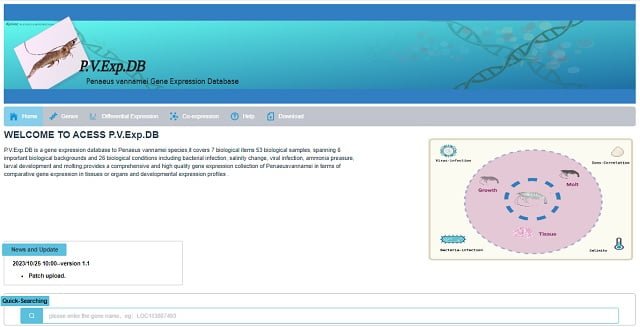
The Pacific White Shrimp (Litopenaeus vannamei) is the primary species in the shrimp industry. Valued for its delicious flavor and impressive growth rate, this shrimp is a significant contributor to global seafood production. But beneath its shell lies a complex molecular world, and scientists are on a quest to uncover its secrets.
Recent advances in genetic sequencing have unlocked a treasure trove of data revealing the inner workings of shrimp genes under various conditions. This includes everything from genetic selection and improvement to their battle against diseases.
However, navigating this vast ocean of information has been a challenge. Data was scattered and disorganized, hindering researchers from piecing together the full picture. In this regard, a team of scientists from the South China Agricultural University, the Nansha-South China Agricultural University Fishery Research Institute, the Guangdong University of Technology, and the School of Life Sciences, Sun-Yat-sen University established PvGeneExpDB, the first gene expression database for L. vannamei, covering gene expression profiles, differential expression, and co-expression analysis in various biological conditions.
A Treasure Trove of Shrimp Secrets
Researchers worldwide have successfully utilized technologies to uncover secrets of human health and animal breeding. For the Pacific White Shrimp (Litopenaeus vannamei), RNA sequencing (RNA-seq) has been pivotal in research on evolution, reproduction, disease resistance, and more.
However, there was a significant challenge: a landscape of scattered data. Valuable RNA-seq data for L. vannamei was dispersed across hundreds of publications and various databases, often lacking detailed annotations and centralized management. This made it difficult for researchers to access and utilize this wealth of information easily.
PvGeneExpDB: Based on Big Data
PvGeneExpDB, the first dedicated database to gene expression of L. vannamei, is like a digital library brimming with information about shrimp genes and how they behave under various conditions. Imagine it as a detailed map of the molecular landscape within the shrimp, revealing how its genes are activated or deactivated in response to factors like reproduction, diseases, and even its evolutionary journey.
The new database called PvGeneExpDB is poised to revolutionize shrimp research. This platform, the first of its kind, offers a centralized repository of gene expression data for L. vannamei, covering four key biological contexts:
- Pathogenic infection
- Larval development
- Molting and growth
- Environmental stress
PvGeneExpDB is the culmination of massive, high-throughput sequencing studies, an elegant way of saying scientists have analyzed the activity of a large number of genes simultaneously. By integrating data from seven different studies and analyzing a whopping 53 samples, PvGeneExpDB provides a wealth of information:
- 20,599 novel transcripts: Researchers have unearthed a hidden treasure trove of previously unknown transcripts, the building blocks that guide protein production.
- 20,817 gene profiles: The database provides a detailed picture of how each gene is expressed, giving us a deeper understanding of the shrimp’s internal workings.
- 76.7% gene ontology reconstruction: Scientists have been able to categorize a large portion of the genes based on their function, providing valuable clues about their roles in shrimp biology.
- 26 co-expressed groups: PvGeneExpDB reveals previously unknown groups of genes that seem to work together, offering clues on how complex biological processes might be orchestrated.
The Potential for the Shrimp Industry
The PvGeneExpDB database has already yielded significant results. Researchers have identified novel transcripts, predicted possible new genetic loci, and refined existing annotations. PvGeneExpDB allows researchers to:
- Explore gene expression patterns.
- Investigate transcriptomic dynamics under different conditions.
- Identify biological mechanisms through co-expression networks and pathway knowledge.
This new database marks a turning point for both researchers and shrimp breeders. By providing a comprehensive view of gene expression, PvGeneExpDB can help us:
- Improve breeding programs: By identifying genes related to desirable traits like growth rate or disease resistance, breeders can develop even better shrimp varieties.
- Combat diseases: Understanding how genes respond to pathogens can lead to the development of more effective disease prevention and treatment strategies.
- Unravel the shrimp’s evolutionary history: By analyzing gene expression patterns in different shrimp populations, scientists can gain insights into how this species has adapted and evolved.
Conclusion
PvGeneExpDB is a valuable resource for researchers seeking to understand the molecular mechanisms behind the development of L. vannamei, response to environmental stress, breeding strategies, and disease resistance. This newfound knowledge will unlock the full potential of this valuable aquaculture species, ensuring a sustainable and productive future for this incredible “shrimp” creature.
The study was funded by Plan Project of Science and Technology of Heyuan, Special Science Found of Nansha-South China Agricultural University Fishery Research Institute, Guangzhou, and Modern Agriculture Industry Technology Innovation Teams, Department of Agriculture and Rural Affairs of Guangdong Province.
Contact
Yuanyan Xiong
Key Laboratory of Gene Engineering of the Ministry of Education, Institute of Healthy Aging Research, School of Life Sciences, Sun-Yat-sen University, Guangzhou, Guangdong 510006, China
Email: xyyan@mail.sysu.edu.cn
Lian Gan
College of Marine Sciences, South China Agricultural University, Guangzhou, Guangdong 510642, China.
Email: ganlian@scau.edu.cn
Reference
Xiong, X., Xie, C., Li, S., Wang, Y., Jiang, J., Xie, D., Chen, S., Xiong, Y., & Gan, L. (2024). PvGeneExpDB: An integrative gene expression database for in-depth understanding on the Pacific white shrimp (Litopenaeus vannamei). Comparative Biochemistry and Physiology Part D: Genomics and Proteomics, 50, 101227. https://doi.org/10.1016/j.cbd.2024.101227

